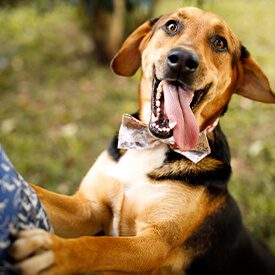Have you ever wondered whether your dog’s mouth is clean? Or have you ever heard the statement that “a dog’s mouth is cleaner than a human’s mouth?” If so, you might be interested to learn more details about the true cleanliness of a dog’s mouth.
In this article, we’ll break down some information for you and make it easier for you to understand just how clean your dog’s mouth really is. Read through this information and make sure to ask your veterinarian if you have any more questions about your specific dog’s cleanliness or hygiene.
Is a Dog’s Mouth Really Cleaner?
No, dogs’ mouths are not actually cleaner than humans’ mouths. However, this misconception comes from the fact that dogs have different types of microorganisms present in their mouths than humans do, and many of these do not have any negative effect on humans.
Humans have about 615 types of bacteria that can be found in any given mouth, while dogs have about 600. The difference here is negligible, and since dogs also tend to chew and eat more garbage and other unsanitary items in their environments, it’s safe to say their mouths are equally as dirty as humans’.
Is a Dog’s Mouth Healing?
There is an old myth that a dog’s mouth has healing properties, and that letting a dog lick a wound is a good way to help the wound heal faster. This is not true, and in fact, letting your dog lick an open wound increases the possibility for an infection.
With that said, however, letting a dog lick his own wounds can help promote healing. Dogs’ saliva contains healing properties for their own bodies and can help soothe and cleanse open wounds and injuries. Just make sure your dog isn’t licking too much and causing hot spots.
Can Dog Saliva Spread Disease?
Yes, from dog to dog. It is possible for dogs’ mouths to be contaminated with bacteria, viruses, and other pathogens that can spread easily to other dogs through licking, biting, or sharing food and water dishes. This is why it is so important to have your dog vaccinated for common dog illnesses before boarding him at a kennel.
It is not very common for dogs to spread diseases to humans through their saliva, but that doesn’t mean it’s impossible. Dogs may sometimes spread parasites and salmonella from their mouths to humans.
Does a Dog’s Breath Indicate Mouth Cleanliness?
In short, not really. A dog may have very bad breath for a variety of reasons, including eating something out of the garbage or finding a “snack” in the cat’s litter box. However, if your dog’s breath is exceptionally bad and it never seems to get any better, or it gets worse, this may mean he’s dealing with a dental health problem.
The smell of your dog’s breath can also indicate diseases such as diabetes or liver failure. If your dog’s breath is sickeningly sweet, this could mean he’s suffering from one of these conditions. Take him to the veterinarian if you think there’s any risk of an underlying health condition.
What Kind of Dental Hygiene is Best for Dogs?
It’s a good idea to keep up with regularly brushing your dog’s teeth. Some dogs may need to have their teeth brushed every week, but others can have their teeth brushed a couple of times a month. Additionally, you should give your dog dental hygiene chews to help keep up with dental health needs in between brushing.
In some instances, dogs may need dental cleanings by a professional. If your vet recommends a teeth cleaning for your dog, you can ask for more information to determine whether it’s right for your pet.
Should You Eat After a Dog?
No–it’s not usually considered safe or a good idea to eat after your dog. Although many pet owners are not above sharing bites of food with their pets and then eating from the same plate, this habit can potentially spread parasites between the two of you.
Skip Sharing Your Food with Your Dog for the Safety of Both of You
Now that you’ve had a chance to learn some more about your dog’s mouth, are you ready to go give her a big slobbery kiss? Learning about your dog’s hygiene and cleanliness can help you better understand her and make it easier for you to interact with her too.
Just keep in mind that your dog’s dental and oral hygiene depend on you. Make sure you brush your dog’s teeth often and give her dental hygiene treats frequently as well. If your vet recommends a teeth cleaning for your dog, you can ask for more information about this procedure as well.
Need to Talk with a Vet?
Do you need to talk with a vet about your dog’s dental needs? Call Country Club Animal Hospital at (305) 663-3300 or book an appointment online!

